How does a kid born in Cyprus, an island nation in the Mediterranean where there is no Standardbred racing, end up winning the Little Brown Jug?
Well Charalambos Christoforou, better known to many as ‘The Greek’, did it by working hard, finding a little luck, and following his strong passion for life in general. Along the way he’s also had a lot of fun and maybe even gotten into a little bit of trouble too. By Dan Fisher.

If you ask Google what it means when a person is passionate, you’ll read that ‘A passionate person has very strong feelings about something and/or a strong belief in something’.
Multiply that thought about a million times over and you’ll begin to get a glimpse of the fire that has burned inside of Charalambos Christoforou - better known simply as THE GREEK - throughout his long, very successful and seemingly never-a-dull-moment life. Some-times this depth of passion, especially if not controlled, can land a person into some hot water, which was definitely true during Christoforou’s younger days, but in the end it has also been what has fueled him to succeed in both harness racing and life itself.
Born on the island nation of Cyprus (just southeast of Greece) in 1944, the 77-year-old Charalambos (har-lam-bos) Christoforou is a proud husband, father and grandfather who has left his mark on the world of North American Standardbred racing, even though he wasn’t brought up anywhere near the sport.
Charalambos, which means ‘glowing with joy’ in Greek, does exactly that when talking about his family, and that family includes a long list of horses - mainly homebreds - that the proud owner-breeder-trainer has seen rise to the pinnacle of the sport over his 50+ years of involvement.
More on the horses and their successes later. First though you may wonder, when so many of our participants get involved in this game via family, how did a man born on an island in the Mediterranean, where there are no ‘trotters’ at all, ever get involved in harness racing to begin with?
“During the war [World War II] my father was the stallioneer for the British Government,” Christoforou shares while sitting in his home office - a room full of more photos, magazines, framed pictures and horse racing memorabilia than one can imagine. Cypriots are known for their hospitality, and that couldn’t be more evident than on this morning in the home of Charalambos and his wife of 52 years, Kathy, as they treat their journalist-guest like royalty.
“Cyprus was an English Colony at the time so although there was no real fighting taking place there then, they still used the island to store goods and weapons… and horses. My dad was the man that took care of all the horses. They were basically all kept right in our back-yard so I was around them a lot,” smiles the man with a smile that could charm a rabid dog, as he recalls his early days around the animals he would eventually make a career breeding, owning, driving and training.
The Greek’s first introduction to racing however didn’t really come until 1961, when he left Cyprus for college in England - and discovered the racetracks and betting shops of the U.K. A few years before that though, the young man went through a significant change of address back in his homeland.
“I was a bit crazy and my dad got a bit sick of me being a nuisance, so when I was about 12-years-old I went to live with my Aunt. He also knew that it would help me get a better education. I went from living in this small village to living in a mansion. When I was living with my aunt I was driving the same kind of car as King Constantine,” laughs Christoforou.
It was the result of his aunt’s influence, a wealthy philanthropist who was married to an American gentleman that owned copper mines in Cyprus, that set the young Christoforou forward on his path to England, and it was there where he spent some of the most memorable years of his life. It was in England where he met his future wife and where he developed a love for football (soccer) and horse racing. England was also a place where the passionate Greek got himself into his fair share of trouble too.
“My aunt put me into the American Academy of Cyprus, a top private school where I lived and went to school for two or three years. If you graduated from there you didn’t even need to write entrance exams for other schools. Then I went to a top technical school in Athens for three years. In Athens I pretty much had a big house to myself because my aunt was in America all of the time… she was hardly ever there. Because I went to and graduated from those schools I was able to go to a top college in London [England] and I got my degree from the College of Aeronautical and Automobile Engineering… that was in Chelsea, one of the nicest parts of London.”
The six years in London, as already mentioned, were life-changing for Christoforou for many reasons, not the least of which because it was when he learned to hustle, and work hard to survive, especially if he wanted to be involved in the high-risk world of horse racing and everything that went with it.
“He was running around to all of the racetracks,” smirks Kathy. Horse tracks, dogs, anything.”
“I’d go to the American Express place once a month to get the money from my aunt so that I could live for the next month,” shares The Greek.
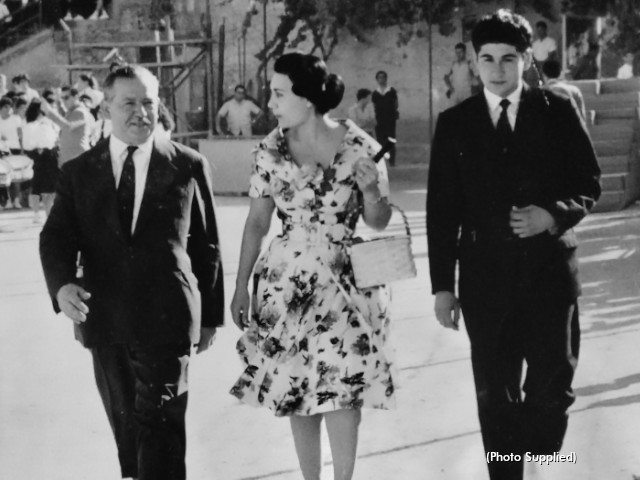
“And the money would never last,” deadpans Kathy with a wink.
“I’d usually be broke shortly afterwards,” Charalambos laughs. But I learned to survive too. I got jobs doing things like renovating houses, or I’d take my suit and my watch to the pawn shop to get two pounds so I could live. I learned to hustle and to do what I had to do if I was going to live that way.”
“I was working for the BBC when we met, and then got a job with a solicitor,” smiles his quiet wife Kathy. At this point it’s easy to see why the marriage works so well, and serves as a reminder that opposites do indeed attract.
During those days, as the young couple grew closer, the flamboyant and sometimes hot-tempered young Cypriot also found himself in his fair share of ‘situations’.
“I was crazy then,” Christoforou says without joking. “There was one time when we were walking down the street and this guy looked at her. I didn’t like how he looked at her so I just started to yell at him… I started punching him because I was so mad,” he recalled. “Remember [talking to Kathy] that guy with the store across from your house… when you bought the eggs from him and he said something rude to you? I took the eggs back across the street and asked him to come apologize to her, and when he wouldn’t, I threw all of the eggs at the front window of his store,” he laughs at his younger self.
Charalambos starts to tell a story of a London coffee shop called ‘La Siesta’... a place where the young couple and their friends would frequent before an altercation between The Greek and the owner of the establishment brought that to an end. Kathy had left the room at this point and as she walks back in she hears approximately two words from her husband and comments, “you’re talking about the coffee shop.” It’s obvious that the tales of the London days are all true, and that the very smart and hard-working young man was also very passionate about life… in both a good way and sometimes not so good.
“That coffee shop always had a bowl of brown sugar and a bowl of white sugar sitting on the tables. Kathy was just stirring the sugar with a spoon and the owner made a rude comment to her and I snapped. I got mad at him and chased him back through the kitchen and out into the alley. I never caught him but we weren’t allowed back there again,” he laughs.
“We had to go to the coffee shop across the street after that… I didn’t like it there nearly as much either,” shrugs Kathy.
Six years in London were so very memorable in many ways, but The Greek’s degree was a five year degree, so why was he there for six? “I took a year off in the middle to play,” Charalambos recalls with a chuckle.
Kathy simply laughs, rolls her eyes a bit and smiles.
“I worked at a few Thoroughbred stables for a while and I also worked as a croupier [dealer] in a legal betting shop. We dealt poker… the games would start Friday night and run straight through until Monday morning. The players would come and go all weekend but the dealers never left… we worked all weekend with a few breaks. That was a good job but it came to an end one night when I got into an argument with the boss. Sometimes when the games were just starting and there weren’t enough players, the boss would give one of us 20 pounds and tell us to play… we were supposed to fold all the time though and not to win. I got some really good cards one time though and I said ‘F%$# this, I’m not folding’. I won and he got mad at me. I was a pistol though… no one could say anything to me. I was young but I was fearless. I got into a big argument with him and flipped the card table over... that was the end of that job,” he smiles.
Upon graduating with his engineering degree and before they could get on with their lives, Christoforou had to head back to Cyprus to complete an obligatory tour of duty in the army. Believe it or not it was a situation made a bit easier by The Greek’s affable personality and even due to his newly learned knowledge of the runners.
“Every young man in Cyprus had to serve two years in the army when they turned 17, but I was gone to England for school at that age. When I got back I was older than the rest of the kids doing it and they only made me do 18 months. There was the green line that literally ran right through Nicosia [the capital] and there was a big barbed wire fence along it. The Greeks were stationed on one side and the Turks were right along the other. I was lucky when I was in the army that there was no real fighting going on but when you were on a shift for eight hours or so you had to sit there and stare straight at the Turk across from you the whole time… his job was to do the same thing on the oth-er side. It was no fun and it was boring but I made friends with a General that loved horse racing,” Charalambos beams. “There was only one hippodrome in Cyprus and they raced every Sunday afternoon so I would get to leave and go to the races with him. I knew a lot more about the races than he did so he’d take me with him every Sunday.”
With his 18-month army commitment completed, including a few visits from Kathy along the way, the young couple were married in England in 1968 and not long after headed to Canada to start their new life. After brief employment elsewhere Christoforou joined the po-lice force in Toronto, but it was a profession that Kathy says he was never truly suited for.
“I stayed on the force for three years,” he recalls, “but the pay was only $6,000 or $7,000 a year and I didn’t like it. As soon as I got promoted to first-class I quit. I had been going to Greenwood and Woodbine, and a friend and I had even bought a horse that Bill Hicks trained for us. I knew Les Ehrlick - he owned a tack shop in the neighbourhood where I was a cop - and he got me a job with Bill Wellwood. I was always meant to be with the horses.
“I only worked for Wellwood for six months… he was always very good to me and I learned a lot there, but I had the chance to buy a horse around 1972 and I went out on my own. Viola Walker [Larry’s mother] sold me a horse named Ash Song… he was a full brother to that really good horse, Danny Song A. He was tried and tested before I got him and was just a racehorse, but he was mine and I struck out on my own. I couldn’t get any stalls on the Jockey Club so I was stabled on the Markham Fairgrounds at first. I didn’t own a jogger, or a race bike or even a trailer. I was able to get a bike from Les Ehrlick for $25/month and there was a woman at the fairgrounds that had a single-horse trailer that I could borrow. I’d pull the trailer from the bumper of my big old Pontiac and tie the race bike to the roof of my car… I had to put the windows down a bit so I could tie the bike down so it wouldn’t fly off. I had a portable fan that I’d turn on inside the car be-cause it was hot and I had no air conditioning. One night I actually had two in at Greenwood… I had to take the first one in early, leave him there and go back to Markham for the second one. Then after the races I had to take them back separately too. I probably got to sleep around 4am and was back in the barn two hours later. Eventually a really nice man named Bob Larrabee saw me jogging my horses in the racebike and told me I could borrow his jogger. I was never afraid to work hard though to make things happen. I missed a lot of things like Chris’ hockey games because I couldn’t afford to hire much help and I worked all the time. Kathy was always great and was doing all the stuff with [son] Chris when he was young because I was always working.”
It’s a statement often echoed by successful horsepeople - the long hours and missing out on family life - but one that seems to go in-hand with positive results in the industry. Where did this work ethic come from in The Greek’s case? Was it a Cypriot trait or something passed down through family? Was it from his days in the army or from those when hustling around England just trying to survive?
“It’s just the person,” says Christoforou. “Some people are hard workers and others aren’t. It also comes from the passion of loving the horses and wanting to succeed. When I want something I’ll work until I make it happen. No matter what it takes I won’t stop until I succeed.”
It took a bit of time and a lot of hard work but succeed he did.
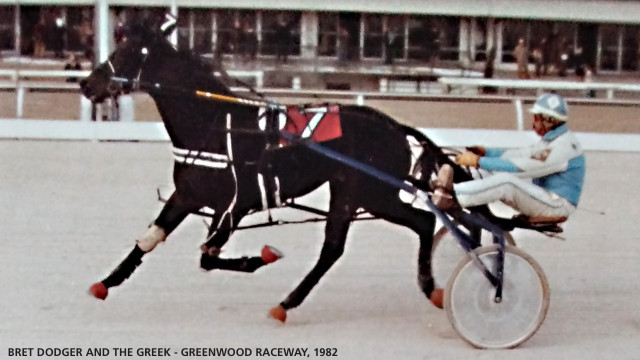
“We had a horse named Haluva Dodger and we did pretty good with him. He couldn’t beat Clint Hodgins’ good horse, Pats Bye Bye, when they were two but that horse was much bigger and everybody always joked that he was actually a three-year-old anyway [laughing]. We made some money with him though and that’s partly why we ended up with my first good horse, Bret Dodger… he was the one that changed every-thing for us. I saw Bud Fritz race him at two and he made two breaks and still almost won… he was so fast. So we bought him for $12,000… I bought him with two of my first owners, guys that I met while I was still a policeman. Rocco Colangelo, he owned supermarkets, and Joe Leonardis, who was in real estate. I qualified Bret myself when he was three and he was good, but the Jockey Club wouldn’t take his entry to race because they said he made too many breaks. So I took him to Windsor… I think he made three or four breaks in that first start and still won [laughing] but the assholes disqualified him. He lost ground on the breaks and didn’t interfere with anyone… they shouldn’t have placed him.
“I had to cover him up completely to race… bell boots, shin boots and knee boots up front and brace bandages and bell boots behind… because he’d touch everywhere. But he could fly and he made us a lot of money [$382,610]... and I drove him a lot too. He would have made us a lot more money if I hadn’t been his driver though [laughing]. He raced against Millers Scout and even Fan Hanover. He’ll always be special to me because he was the one that got things going for us.
And as things did start to roll, what about the fiery Christoforou? He brought determination and a strong work ethic to Canada but did any of the outbursts and situations that arose in England follow The Greek across the pond as well?
“I believe in the things I believe in and I usually feel strongly about them. I’m calmer and more peaceful now than I was years ago,” Charalambos admits, “but over the years there were a few times that I felt that I had to stand up for what I believed in. I work hard for what I have and I don’t let anyone take advantage of me.
“I won’t take no for an answer when I want something. I’ll work as hard as I have to and do what I need to do to make something I want to happen, happen. When I wanted to get elected to the Canadian Standardbred Horse Society [CSHS] I had to run against Bob Burgess and he was the president of the CSHS - he was the king. But I bought the contact list for the members and called and talked to hundreds of people… visited people every day. I worked at it so hard and I actually won the election. That’s just how I do things - I’ll work until I succeed.
Christoforou tells a story from when he was on that very CSHS board, where his passion and stubbornness could have made some waves, but where his charm also helped smooth things over at the same time. He was still that same strong-minded man - he’s still that man today - but he was learning to use his charm as well, instead of just his fists.
“We were arguing over the rules for breeding mares and it was just myself and a few other breeders against the world in there. I was yelling at them because I wanted them to make it ok to ship the semen but of course the big farms didn’t want that… they wanted to make breeders send their mares to them. We were taking a break from the discussions and I told them all that if the vote didn’t go my way that things might get ugly [laughing]. They knew I wasn’t serious though and later that day when they took the group photo of us all I started to drop my zipper in the picture and I told them all I was going to show them what I really thought of them - everyone laughed.
“There was another time when I had been racing down in Buffalo and Batavia for a while. They didn’t like Canadians coming down there back then but most of them were afraid of me. [Tom] Artandi had to keep a Doberman on a wire in his shedrow overnight because they were slashing his harnesses and tires and things. I didn’t have much trouble with most of them but there was one guy who had parked me a few times. I was friends with his father and everything… the guy wasn’t a bad guy, but one night when I had the outside and I was going to leave and he was inside me, I went over to him before the race and I basically threatened him, in my own way [laughing] that he’d better not park me tonight. They didn’t mess with me too much down there though. One time the paddock judge down there called me in before the race and told me they were going to fine me because I was using the Modified Sulky but it wasn’t in the program as I hadn’t marked it down when I entered. I did mark it down though and they were just trying to screw me over. I told him to ‘F%$# off’ and I scratched my horse and walked him out of the paddock. I didn’t let them play their games with me.”
Established as a solid conditioner, but maybe an unspectacular driver, on the OJC Circuit for a number of years, two of the proudest developments of Christoforou’s career came in the early ‘90’s. Son Chris Jr., who is now the second leading driver in O’Brien Awards history with four Canadian Driver of the Year titles, began his driving career in 1990, and homebred trotting colt Earl began racing in 1992.
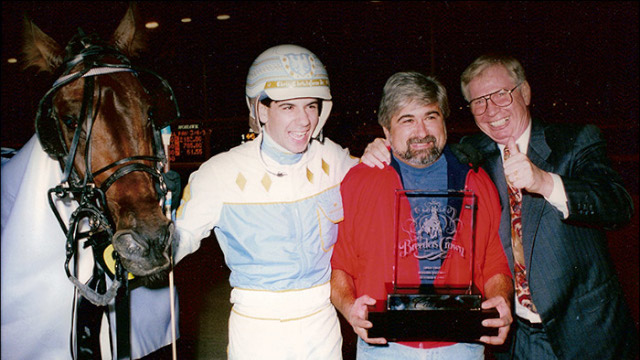
“I bought Earl’s dam [Linfields Gem] for some owners when she was a yearling, partly because her sister was the two-year-old trotter of the year. In two years I don’t think she ever trotted a quarter of a mile in a training trip without making a break… we tried everything but she couldn’t trot at all. I bought the owners out in exchange for what they owed me in bills and I bred her… her third foal was a Balanced Image colt we named Earl [$984,318]. They all gave me a hard time because they said Chris was too young to drive him, but the two of them learned on each other. Earl was easy to drive, you could do anything with him, and Chris had talent… I knew he was ready to drive a good horse. He didn’t race at two because he had an issue with his back. There was a woman chiropractor that had an office downtown near Harold Shipp’s building and she used to love hanging around the track. One day she worked on [adjusted] Earl and just like that he started trot-ting better. I remember one time when she was going to come work on him before a big race and she called and said she couldn’t make it. I loaded him up and drove him right downtown Toronto, took him off of the trailer and walked him down an alley to meet her in someone’s little yard… she fixed him up right there in the middle of the city [laughing]. When Earl won the Breeders Crown at Mohawk [as a 4YO in 1993] Chris became the youngest driver in history to win a Breeders Crown… so I guess he was ok to drive him wasn’t he?”
The other top-notch colt that took Christoforou to the top of his profession was 2000 Little Brown Jug champion Astreos [$1,062,594]. Technically Astreos wasn’t a homebred like Earl but he was born and raised under The Greek’s watchful eye.
“I wanted to have an Artsplace colt but they were all too expensive at the sales, so I bought the dam [Lucky Tune] in foal to Artsplace for around $8,000. An old owner of mine, Dr. Cummings, from Lexington, approached me a little later and said that they had wanted to buy the mare but they got caught in traffic or something. They offered me $12,000 for her but I said ‘no’ to the shot at a quick profit. You have to be a bit lucky in this game and I was lucky I didn’t sell her and take the easy money. Bill Wellwood’s best horse when I worked for him was Keystone Gary. He had bought another yearling earlier in that sale and sold him to someone a few minutes later when offered a quick profit. He used the money to buy Keystone Gary later that day and the rest was history. You always need to be lucky.
“When Astreos was a yearling he was at Bill Loyens’ place and everyone that came to see Bill’s yearlings loved him - he was perfect. They all wanted to buy him and I priced him at $100,000. At one point I thought that Ben Wallace was going to buy him but it never happened.
“When I qualified him at two we knew he was a special colt but he drew the 8-hole in his first start. I got so mad that I scratched him… I wasn’t going to race a nice colt like that from post-eight, on a 5/8ths mile track, in his first start. Screw them. Later that year before the Breeders Crown [where he’d go on to finish second] I priced him at $600,000 and my good friend Irving Storfer [Banjo Farms] bought in… so did my cousin Makis, from Cyprus.
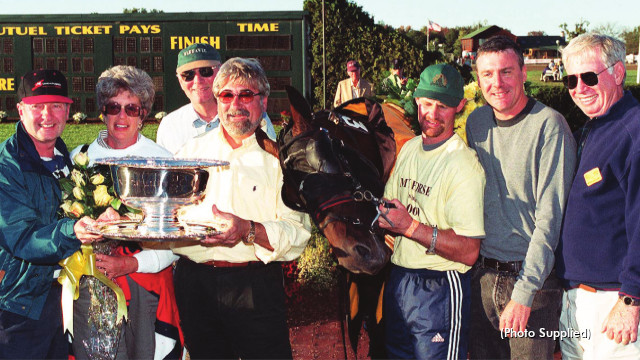
“He was a great horse for us but I wonder how much better he would have been if he didn’t have a bad heart. He flipped it in his last start at two at Garden State [Governor’s Cup]. We took our time bringing him back at three and made sure he was good and healthy, but I’m sure it had to have limited him in some way. The Jug was hard on him… he was in the harness that day for five hours [three heats]. He was second in the Cane before that… the winner interfered with us and cost us the race but the judges left him up. I wanted to appeal it but got talked out of it. After the Jug we went to the Messenger and drew outside at The Meadows. I wasn’t happy about the draw but he finished second in his heat [beat only a neck]. We waited and waited for them to draw the final in front of the crowd like they always do, but they didn’t do that. They just announced the results of the draw over the speakers and when they said he’d drawn post-eight I went wild. I snapped. I called [Brett] Pelling in the paddock and told him to scratch him… he begged me not to but I told him if he didn’t scratch him I’d walk around, take him from the paddock, walk him in front of the grandstand and yell up to the judges and ask them why they didn’t do the draw in front of anyone. He had Chris call me from the paddock a few minutes later and ask me again to race him but I scratched him. I was furious and said ‘F%$# them.’”
Both Astreos and Earl would go on to successful careers as stallions, even though Astreos’ second career was cut short, at just six crops, after he was found dead in his paddock at Alabar Stud in New Zealand - apparently his heart issue being the cause. Astreos sired the winners of more than $62 million including millionaires Voelz Hanover, Zooka, To Helen Back and Sparky Mark. Earl’s progeny earned more than $32 million and included double-millionaire JM Vangogh and millionaire Earl Of My Dreams - who was raised, owned and trained by Christoforou himself.
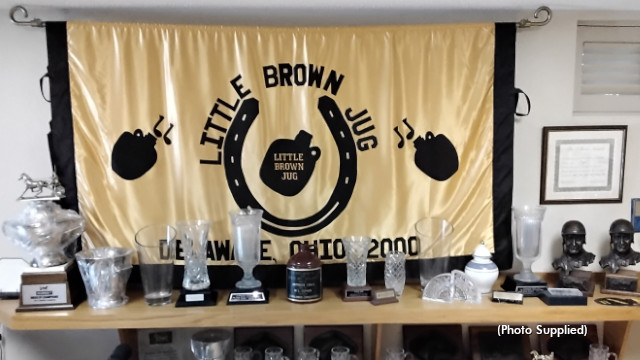
“We got lucky a few times,” he says as he smiles that charming smile, “but I always worked hard too. I never took things for granted and always thought we could do better if we tried. I’ll always remember when Chris called me one night on his way home from Woodbine and told me that he won seven races that night... it was a new record for wins on a single card. I told him that was good, but then I said that if he didn’t F%$# up that other race he could have won eight [laughing].”
Charalambos Christoforou is definitely not a man that was cut from a mold - he’s a one-of-a-kind individual. He makes no excuses or apologies for who he is, and he always shoots from the hip (maybe sometimes even literally). One always knows where they stand with him, and although the truth may sometimes hurt, in the end it’s better than a lie. Passion is his strong suit. At times perhaps it has also been his biggest weakness. In the end however, it’s probably the one trait that’s taken him so far in life. He’s ‘Bambos’ to his loving wife Kathy, son Chris, daughter-in-law Camilla, and grandchildren Emma, Niklas and Mia, but to most everyone else he’s simply ‘The Greek’. He’s definitely a character, but he also has a lot of character, and love him or not one thing is certain - you’ll always know when he’s in the room.


